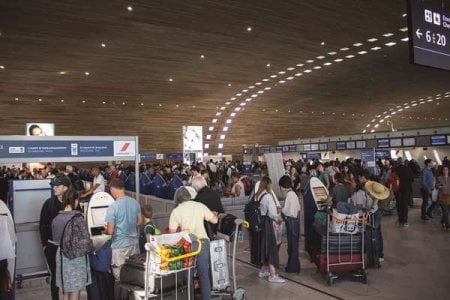Travel expert flags ‘dangerous trend’ amid cost-of-living crisis
By
- Replies 13
Whether it’s a local day trip or a much-awaited overseas excursion, the lure of travelling is hard to resist.
We hear from people around us all the time about their travel adventures. However, there is a worrying trend that a travel expert has noticed: Aussies cutting costs on their holidays.
It's no secret that the cost of living has increased significantly over the years, which of course affects how much we can spend for a break. And while some are being thrifty, others may be sacrificing safety for the sake of savings.
This ‘really dangerous trend’ was highlighted by Angus Kidman of online comparison site Finder, who said recently that their new research had revealed 'some of us are definitely putting saving money ahead of our health'.
The Finder survey—which had 1062 Australian respondents, 718 of whom had travelled in the last 12 months—found that almost half (46 per cent) had altered their travel insurance in some way to cut costs.
'The biggest worry is the 15 per cent of folks who are planning to travel internationally without insurance,' Kidman said.
'An accident or a health scare could see you tens of thousands of dollars out of pocket for a repatriation flight.'
This advice might hit a nerve for those with a tighter budget, but Kidman stressed: don't go on a holiday if you can't afford travel insurance.
Moreover, even insurance policies that you can get for a cheaper rate may still not be the best option. The survey also found that eight per cent of people cancelled activities that would increase the cost of their premium, while another eight per cent lied about details on their application to get a lower rate.
'Insurers will investigate before paying out claims, and if you lie about a health condition or which countries you plan to visit, chances are you won’t be covered,' Kidman warned.
In addition, 21 per cent of those surveyed said they took out the cheapest insurance option available. Kidman cautioned against this, saying that while 'cheap policies aren’t inherently bad', you should be sure to fully understand what is and isn't included within the deal you’re getting.
‘There have always been people willing to take a chance and not take out travel insurance at all,’ he explained.
‘What we’ve seen rising is folks being more cautious with their spending, and perhaps favouring a cheaper deal rather than aiming for more comprehensive coverage.’
Take this as a lesson: if you're determined to travel and money is tight, it's wise to be resourceful, but don't risk your safety in the process.
As such, Finder reminds travellers to read the fine print before signing any agreement.
Furthermore, even if the policy has comprehensive cover, a claim may be deemed invalid if you don’t act ‘responsibly’—things like having had too many drinks, not wearing a helmet while riding a motorbike, or driving while unlicensed.
On a related subject, Australians heading on cruises need to note that Medicare and private health insurance won’t cover for medical costs, even if the trip is taking place in Australian waters. To be fully insured, you need a separate domestic cruise policy or a specific international travel insurance plan.

What do you think of this story? Let us know in the comments below!
We hear from people around us all the time about their travel adventures. However, there is a worrying trend that a travel expert has noticed: Aussies cutting costs on their holidays.
It's no secret that the cost of living has increased significantly over the years, which of course affects how much we can spend for a break. And while some are being thrifty, others may be sacrificing safety for the sake of savings.
This ‘really dangerous trend’ was highlighted by Angus Kidman of online comparison site Finder, who said recently that their new research had revealed 'some of us are definitely putting saving money ahead of our health'.
The Finder survey—which had 1062 Australian respondents, 718 of whom had travelled in the last 12 months—found that almost half (46 per cent) had altered their travel insurance in some way to cut costs.
'The biggest worry is the 15 per cent of folks who are planning to travel internationally without insurance,' Kidman said.
'An accident or a health scare could see you tens of thousands of dollars out of pocket for a repatriation flight.'
This advice might hit a nerve for those with a tighter budget, but Kidman stressed: don't go on a holiday if you can't afford travel insurance.
Moreover, even insurance policies that you can get for a cheaper rate may still not be the best option. The survey also found that eight per cent of people cancelled activities that would increase the cost of their premium, while another eight per cent lied about details on their application to get a lower rate.
'Insurers will investigate before paying out claims, and if you lie about a health condition or which countries you plan to visit, chances are you won’t be covered,' Kidman warned.
In addition, 21 per cent of those surveyed said they took out the cheapest insurance option available. Kidman cautioned against this, saying that while 'cheap policies aren’t inherently bad', you should be sure to fully understand what is and isn't included within the deal you’re getting.
‘There have always been people willing to take a chance and not take out travel insurance at all,’ he explained.
‘What we’ve seen rising is folks being more cautious with their spending, and perhaps favouring a cheaper deal rather than aiming for more comprehensive coverage.’
Take this as a lesson: if you're determined to travel and money is tight, it's wise to be resourceful, but don't risk your safety in the process.
As such, Finder reminds travellers to read the fine print before signing any agreement.
Furthermore, even if the policy has comprehensive cover, a claim may be deemed invalid if you don’t act ‘responsibly’—things like having had too many drinks, not wearing a helmet while riding a motorbike, or driving while unlicensed.
On a related subject, Australians heading on cruises need to note that Medicare and private health insurance won’t cover for medical costs, even if the trip is taking place in Australian waters. To be fully insured, you need a separate domestic cruise policy or a specific international travel insurance plan.
Key Takeaways
- A travel insurance expert has warned Australians that not ensuring adequate insurance for travel to cut costs is a 'really dangerous trend'.
- A survey found that nearly half of respondents had altered their travel insurance to save money, while 15 per cent planned to travel internationally without any insurance.
- The survey also revealed eight per cent of respondents had lied about details on their insurance applications to get cheaper premiums.
- Travel comparison website Finder has urged travellers to thoroughly read their policy's fine print, cautioning that even comprehensive plans may become void if certain terms are violated, such as acting irresponsibly.
What do you think of this story? Let us know in the comments below!









